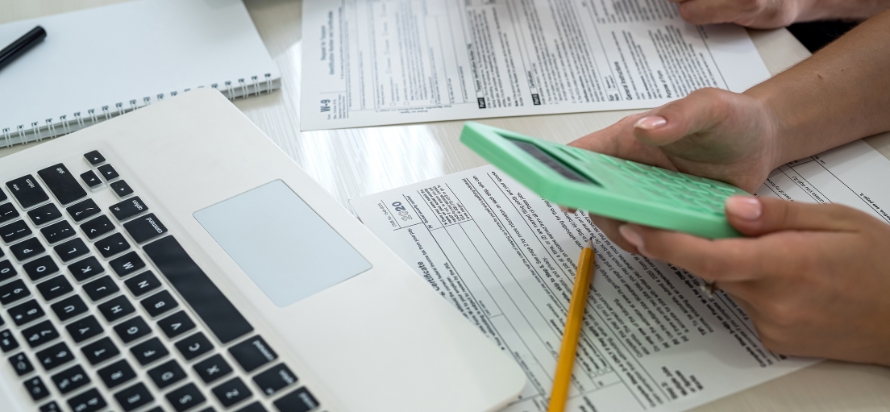
If you're employed, self-employed, or earning extra on the side, knowing exactly when do you have to pay for taxes is the solution to stay out of trouble with HMRC. The UK tax system has clear deadlines, but they can be different depending on how you earn your money.
This blog breaks it all down in simple terms, so you’ll know what to pay, when do you pay tax, and how to stay organised all year round. Whether you're filing a Self Assessment or just checking your PAYE, understanding tax year dates will help you plan better.
Your 2024/25 tax bill is due on 31 January 2026. If you haven’t paid it by then, HMRC will start charging you interest from 1 February 2026 until it’s fully paid. If it remains unpaid by midnight on 2 March 2026, you’ll also receive a 5% late payment penalty on top of the interest.
Knowing your tax return dates and payment deadlines helps you:
The financial year 2025/2026 covers the tax period from 6 April 2025 to 5 April 2026. Here are the important tax return dates and payment deadlines you need to be aware of:
|
Deadline |
Date |
Description |
|
Register for Self Assessment |
5 October 2025 |
If you're new to self-employment or have untaxed income, you must register with HMRC by this date to file a tax return for the 2024/2025 tax year. |
|
Paper Tax Return Submission |
31 October 2025 |
The deadline for submitting paper Self Assessment tax returns for the 2024/2025 tax year. |
|
Online Tax Return Submission |
31 January 2026 |
The deadline for filing online Self Assessment tax returns for the 2024/2025 tax year. |
|
Tax Payment Due |
31 January 2026 |
Any tax owed for the 2024/2025 tax year must be paid by this date. |
|
First Payment on Account |
31 January 2026 |
Advance payment towards your next tax bill, based on your previous year's tax liability. |
|
Second Payment on Account |
31 July 2026 |
Second advance payment towards your next tax bill. |
Knowing these tax year dates helps you plan in advance. Always check when does the tax year start and end and the end of tax year UK to stay on track with your payments.
If you are employed, your tax is usually taken from your wages before you get paid. This system is called PAYE, which stands for Pay As You Earn.
So, you normally don’t have to do anything to pay your tax unless something goes wrong.
You may need to contact HMRC or file a tax return if:
Understanding when do you start paying tax under PAYE can also help ensure you’re not overpaying or missing any deadlines during the year.
If you work for yourself, like a sole trader or freelancer, you need to:
You must register for Self Assessment by 5 October after the end of the tax year in which you started trading. It is also very important to know the tax year dates and when do you start paying tax after becoming self-employed.
The tax year date runs from 6 April to 5 April the following year.
For example:
2025/26 tax year: 6 April 2025 to 5 April 2026
The following are the deadlines and what to pay:
|
Deadline |
What to Pay |
|
31 January |
Tax for the previous tax year + 1st payment on account |
|
31 July |
2nd payment on account |
Example:
If your last tax bill was £2,000:
If you’re newly self-employed and wondering when do you start paying tax, your first payment is usually due by 31 January following the end of your first trading tax year.
Company directors usually need to file a Self Assessment tax return, even if they take most income through PAYE.
You also need to file a return if you have income that hasn’t had tax deducted. Common examples include:
Same as self-employed people:
Remember to check when does the tax year start and end and note the end of tax year UK to plan what income you’ll include in your next return.
HMRC helps you figure out your tax if:
If you’re unsure when do you have to pay for taxes, HMRC’s reminders and your online account will guide you based on your tax return dates.
Missing the tax deadline can cost you money.
Penalties:
How to avoid:
Note: Knowing when do you start paying tax and when do you pay tax can help you avoid confusion later. Remember, the financial year ends on 31 March, but the end of tax year UK is 5 April.
If you're unsure about when taxes are due or when do you have to pay for taxes, PHS Associates is here to help. We specialise in guiding individuals and businesses through the UK tax system, ensuring you meet all tax return dates and deadlines without penalties.
Whether you're self-employed, a company director, or just need help with your tax return, our expert team is ready to assist. Contact us by phone at
0208 8611685 or email info@phs-uk.co.uk. We’ll help you understand when do you start paying tax, the tax year dates, and ensure you’re aware of the end of tax year UK requirements.